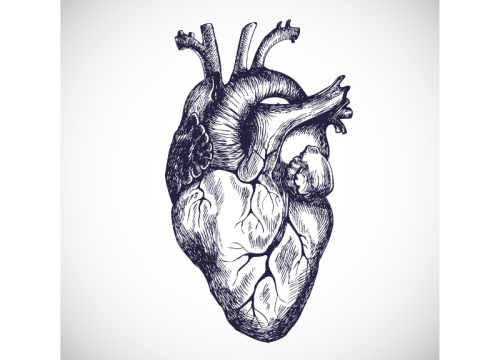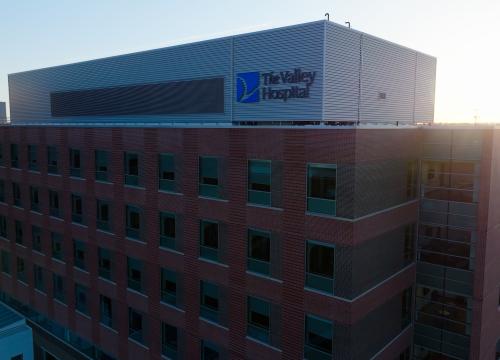Atrial fibrillation (AFib) disrupts your heart’s regular rhythm of electrical signals, which control your heartbeat. This causes the upper two chambers of your heart (atria) to quiver, beating very quickly and irregularly. In turn, your lower two chambers beat faster than normal too.
AFib is the most common type of irregular heart rhythm (arrhythmia). And, if left untreated, AFib can have serious effects. When you’re in AFib, your heart isn’t working as efficiently as it should, which can lead to:
- Blood clots
- Stroke
- Heart failure
- Chronic fatigue
At Valley, our electrophysiology team focuses on getting your heart back to its regular rhythm and preventing further health complications.
AFib Symptoms
Whether or not you experience atrial fibrillation symptoms depends on how fast your heart is beating. Symptoms may come and go in a matter of hours, or they may persist for longer periods. Signs of AFib include:
- Heart palpitations (the sensation of a racing, fluttering or pounding heartbeat)
- Weakness
- Fatigue
- Lightheadedness
- Confusion
- Shortness of breath
- Angina (chest pain)
Talk to your cardiologist or primary care provider if you’re having symptoms of AFib. If they suspect you have AFib, they will refer you to an electrophysiologist (a cardiologist who specializes in treating heart rhythm disorders).
What Causes AFib?
If you have one or more of the following, you may be at a higher risk for atrial fibrillation:
- Older than 50
- High blood pressure (hypertension)
- Heart disease, including heart valve disease
- History of heart attack
- Chronic conditions, including diabetes, hyperthyroidism or sleep apnea
- Family history of AFib
AFib Treatment at Valley
Your treatment plan may include one or more options based on your overall health and your specific needs, including:
- Medications
- Procedures
- Device therapy
- Surgery
Medications
Medication is usually the first step of your treatment plan. This may include:
- Antiarrhythmic drugs to help your heart return to or maintain its normal rhythm.
- Beta blockers or calcium channel blockers to help slow your heart rate during atrial fibrillation.
- Anticoagulants or antiplatelet drugs to reduce your risk of blood clots and stroke.
Procedures
When medications do not correct or control your atrial fibrillation, your electrophysiologist may recommend a procedure, including:
- Cardioversion to reset your heart’s rhythm back to normal with an electrical shock.
- Catheter ablation (a type of heart ablation) to destroy the short circuits or the group of cells causing your atrial fibrillation.
Device Therapy
Your electrophysiologist may recommend device therapy if your atrial fibrillation requires ongoing monitoring and control. Devices include:
- A pacemaker to correct a slow heartbeat. This can happen when you have paroxysmal atrial fibrillation. With this type of arrythmia, your heart beats too fast when it’s in AFib and too slow when it’s not.
- An implantable loop recorder to record and share data with your electrophysiologist when you're having an arrhythmia. These findings help us form a more complete picture over time so we can adjust your treatment plan as needed.
- A Watchman device (left atrial appendage closure device) to help prevent stroke.
Heart Surgery
You may be a candidate for heart surgery if:
- Other treatments do not help to control or maintain your heart’s regular rhythm.
- You have AFib along with other heart conditions like coronary artery disease.
Surgery options include:
- Left atrial appendage closure to prevent blood clots from forming in your upper heart chamber, which could lead to stroke.
- MAZE procedure to help block irregular electrical signals causing your atrial fibrillation.
Why Choose Valley for AFib Care?
- Treating your atrial fibrillation from all sides: We believe that treating underlying causes of your atrial fibrillation is key for controlling your heart’s rhythm. That’s why a team approach is at the core of Snyder Center for Comprehensive Atrial Fibrillation services. Your care team will involve specialists who can help you manage your weight, address stress, improve sleep issues and more.
- Leaders in research: At Valley, we have a dedicated research team that evaluates our atrial fibrillation patients’ treatment outcomes. We are also consistently at the forefront of clinical trials looking at new ways to treat AFib. This level of expertise and innovation allows us to recommend the most promising treatments for your specific atrial fibrillation.
- Continuous monitoring: Throughout and after your atrial fibrillation treatment, we work with you to ensure your heart’s rhythm normalizes. Should your heart’s rhythm become irregular, we have a team on standby ready recommend adjustments to your treatment plan.
- Help with improving your overall heart health: Lifestyle changes can help you better manage or reduce your risk of developing AFib. At Valley, we offer services to help you put lifestyle changes into practice, like our smoking cessation and nutrition programs.


















